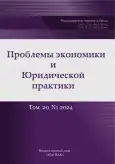Tax Incentives as a Tool of Development of PPP Projects for Emergency Management: Experience of PRC Regions
- Authors: Gao T.1, Turgel I.D.1
-
Affiliations:
- Ural Federal University named after the First President of Russia B. N. Yeltsin
- Issue: Vol 20, No 1 (2024)
- Pages: 196-202
- Section: Regional and Sectoral Economics
- URL: https://journals.eco-vector.com/2541-8025/article/view/633420
- DOI: https://doi.org/10.33693/2541-8025-2024-20-1-196-202
- EDN: https://elibrary.ru/CXFHUK
- ID: 633420
Cite item
Abstract
The purpose of the research. The article discusses the public-private partnership (PPP) projects as an important tool for attracting private sector resources to enhance the efficiency and quality of emergency response. It analyzes the extent to which tax incentives influence the financial decisions of corporations and investment returns in the context of regions in China. The purpose of the research is to identify the role of tax benefits in stimulating the use of PPP projects for managing emergencies. It presents specific cases where tax incentives were utilized to recover participating in PPP projects enterprises during the pandemic. Results. The research revealed that the provision of tax incentives has had a positive impact on PPP projects. This is achieved through the reduction of financial burdens on enterprises, lowering costs for PPP projects implementation, and increasing investment returns. These measures provide critical support for the successful implementation of PPP projects and contribute to sustainable national economic development. PRC’s experience demonstrated that even during social crises such as the COVID-19 pandemic, tax incentives effectively promote private sector participation in infrastructure construction and the provision of public services to harmonize the economic and social goals in public policy.
Full Text
About the authors
Tongtong Gao
Ural Federal University named after the First President of Russia B. N. Yeltsin
Author for correspondence.
Email: gaotongtong0914@163.com
postgraduate student
Russian Federation, YekaterinburgIrina D. Turgel
Ural Federal University named after the First President of Russia B. N. Yeltsin
Email: i.d.turgel@urfu.ru
ORCID iD: 0000-0001-8647-7739
ResearcherId: 6429-9218
Dr. Sci. (Econ.), Professor
Russian Federation, YekaterinburgReferences
- 王倩懿. J县疫情防控税收优惠政策执行中的问题与对策研究[D].中国矿业大学, 2022.doi: 10.27623/d.cnki.gzkyu.2022.002326.
- 白彦锋, and唐艺宁. «中国应对突发公共卫生事件财税政策的对比研究.»经济理论与经济管理.07(2020):17-29. doi: CNKI:SUN:JJLL.0.2020-07-003.
- Rutkow L. An Analysis of State Public Health Emergency Declarations[J]. American Journal of Public Health, 2014, 104(9):1601-1605.doi: 10.2105/AJPH.2014.301948
- 杨园园. «浅谈疫情防控税收优惠政策对企业的促进作用.»中国管理信息化23.17(2020):70-71. doi:CNKI:SUN:GLXZ.0.2020-17-033.
- 陈松. «美国间救助中小企业的政策举措分析及启示.»吉林金融研究.02(2023):24-27. doi:C疫情期NKI:SUN:JLJR.0.2023-02-006.
- 舒亿秦. «后疫情时期上海市小微企业所得税和增值税优惠政策执行研究——基于改良的系统模型视角.»时代金融.08(2023):51-54. doi: CNKI:SUN:YNJR.0.2023-08-018.
- 李先富. «对新冠肺炎疫情下中小微企业财税政策支持的思考.»山西农经.23(2020):148-149. doi: 10.16675/j.cnki.cn14-1065/f.2020.23.070.
- 李慧. «新冠肺炎疫情下公益性捐赠税收优惠政策探析.»税务研究.04(2020):123-126. doi: 10.19376/j.cnki.cn11-1011/f.2020.04.018.
- 中华人民共和国中央人民政府,前三季度全国PPP投资突破14万亿元. Retrieved from: www.gov.cn/xinwen/2019-12/03/content_5457739.htm,2019.12.03
- 中华人民共和国中央人民政府,10月份新开工项目投资增长4.7%——PPP有效拉动重点领域建设,Available at: www.gov.cn/xinwen/2020-12/03/content_5566560.htm,2020.12 . 03
- 中华人民共和国中央人民政府,10月份新开工项目投资增长4.7%——PPP有效拉动重点领域建设,Retrieved from: www.gov.cn/xinwen/2020-12/03/content_5566560.htm,2020.12 . 03
- 中央人民政府,10月份新开工项目投资增长4.7%——PPP有效助推重点领域建设,Available at: www.gov.cn/xinwen/2020-12/03/content_5566560.htm,2020.12. 03
- 中华人民共和国中央人民政府,疫情防控资金到位有保障吗?财政、税收等如何支持? 这次发布会的信息量非常大!,Retrieved from: www.gov.cn/fuwu/2020-02/14/content_5479013.htm,2020-02-14
- 九州通2020年年报,九州通医药集团股份有限公司,Available at: http://www.sse.com.cn/disclosure/listedinfo/announcement/c/new/2021-04-27/600998_20210427_33.pdf
- Naumov, I.V., Krasnykh, S.S., & Otmakhova, Yu.S. (2022). Scenario forecasting of the socio-economic consequences of the COVID-19 pandemic in Russian regions. R-economy, 8(1), 5–20. doi: 10.15826/recon.2022.8.1.001
- Omir, A.S., Panzabekova, A.Zh., Satybaldin, A.A. (2023). Evaluating the Financial Efficiency of the Healthcare System: A Three-Stage DEA Model Analysis. R-Economy, 9(4), 353–365. doi: 10.15826/recon.2023.9.4.022
- Dzhuraeva, Z., Okrah, J., Naziri, G. N. (2023). The effect of COVID-19 restrictions (lockdown) on GDP growth in CIS countries. R-Economy, 9(4), 422–436. doi: 10.15826/recon.2023.9.4.026
Supplementary files











